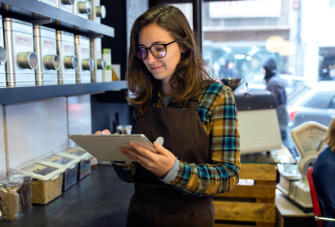How To Start A Coffee Shop: Equipment and Capital Checklist
There are over 60,000 coffee shops across the United States, and the industry has grown 3.2% annually over the last five years. Cafes are perfect for working or relaxing with friends, and they can be the heart of the community.
Owning a coffee shop may seem like a smart business move, but 50% – 74% of small coffee shops fail within five years of opening.
With this in mind, you need to learn how to start a coffee shop that people will love.
How to start a coffee shop in nine steps
1. Set your expectations
Go anywhere in the world, and you will see that any individually-operated coffee shop is unique. From the people, place, and atmosphere, you will get a different experience no matter where you visit.
Before you open, you will need to decide how your shop will operate and what will make visiting it special.
Ask yourself these questions:
- What type of shop will you be?
- Do you want to offer meals, merchandise, or anything other than beverages?
- Will there be a specific vibe?
- Do you have a slogan or lifestyle statement?
- Who will be your clientele?
Half the fun of owning a business is seeing how it changes as you grow, but you will want to have some goals in mind at the very least.
2. Write your business plan
No business can run without a solid plan. How much you prepare will directly affect your chance of success. By creating a coffee shop business plan, you will get a deeper understanding of your market, management needs, and financials.
Make sure to cover these topics in your plan:
- Mission Statement: What does your business stand for, and what does it want to accomplish?
- Your business identity: What is your coffee shop’s name? Is your business a legal entity?
- Expenses: How much is rent in your area? What is a fair wage for staff? How much do equipment and supplies cost?
- Staffing needs: How many employees will it take to run smoothly? How will you hire staff?
- Organizational structure: Will you own and operate? Will you need managers? What is the leadership model?
- Prices: How much will you charge for your goods? What is the market rate for coffee in your area?
- Menu: What items will be on your menu? Will you offer options for those with dietary restrictions?
3. Complete all legal paperwork
You will want to make sure all your affairs are in order before opening your coffee shop. Becoming a legal business is the most important step in this process.
Benefits of creating a business entity:
- Intellectual property: You can trademark your business name, logo, and other unique intellectual property.
- Protection: Business entities shield you from personal liability for certain cases, such as business loan defaults and lawsuits.
- Banking: Create a separate bank account using your business name instead of your personal name.
What type of entity you form depends on your situation. Here are the most common entity types for small businesses:
- Sole Proprietorship
- General Partnership
- Limited Partnership
- C-Corporation
- S-Corporation
- Limited Liability Company (LLC)
We advise speaking with a small business consultant if you have any questions about these entities.
4. Secure funding
Finances will be your biggest challenge as you plan how to start a coffee shop, especially since the average small business loan amount was $663,000 in recent years. However, your coffee shop may need much less or a great deal more depending on your goals.
As we stated earlier, your business plan should outline expected start-up costs and continuing expenses. You will need to show this plan to banks or investors so they can evaluate their
Here are some ways to fund your business:
- Loans: Taking out a small business loan is a simple way to get quick capital to get your coffee shop off the ground.
- Investors: You can partner with independent investors in return for an ownership stake or expected repayment after a set term.
- Bootstrap: You can start your coffee shop with personal cash, but this can take much longer than expected.
5. Find your location
Where you start your coffee shop can make or break your business. You want to choose a location that is easily accessible and has high visibility from passersby. If you have a specific motif in mind, your space should help you build that ambiance.
Since coffee shops can be community hubs and high-traffic areas, it helps to have a parking lot and bike racks. Even better, having a walk-up window or drive-thru lane can increase your appeal tremendously.
Many new coffee shop owners rent their space, but buying can also be helpful. If you plan to carry out major renovations, you may not be able to achieve your design goals with a lease. Also, leasing can lead to some uncertainty about the fate of your business. Even if your coffee shop is successful, you may have to relocate if your manager does not renew your lease or sell the building to someone else.
Lastly, whether you rent or buy, your location will dictate the price. A perfect location may put you in front of thousands of potential buyers, but it can also mean more competition. Make sure your market research covers expected revenue in various parts of your city to ensure you can afford your lease/mortgage.
6. Find suppliers
The average coffee shop sells 230 cups of coffee per day, which means you will need a steady supply of beans for your business. Where will you buy your coffee beans, sweeteners, or food supplies?
There are many vendors that offer these goods, but you want to keep an eye out for the following factors:
- Quality: Cost and quality often go hand in hand, but you don’t want to cut costs if that means sacrificing taste. Guests will not return if they think your coffee is subpar.
- Reputation: Many Americans think globally and do not want to support businesses that benefit from the exploitation of others. You should ensure your coffee comes from reputable sources, such as those with the FairTrade Mark.
- Cost: While paying a premium for good beans may give your guests better-tasting coffee, will they be able to afford higher than average prices?
- Delivery: How frequently will your suppliers deliver your beans? You never want to run out of stock on a busy day!
7. Get equipment
Aside from food and drink, you need other supplies to keep your business running. You will have a few large one-time purchases and some recurring orders to consider.
Some basic equipment you need to start a coffee shop:
- Grinders: Espresso and regular coffee makers need freshly ground coffee to ensure high-quality taste. You will need separate grinders for espresso and regular drip coffee.
- Espresso machine and coffee maker: Coffee and espresso are made through different processes, so you will need both machines to keep up with demand.
- Blenders: If you plan to offer a wide menu, blenders will be useful for smoothies, frappes, and other specialty drinks.
- Toaster ovens: Many coffee shops offer items like sandwiches, so investing in a toaster is wise.
- Refrigeration: Your team will need an under-counter refrigerator for commonly used items like milk, but you will also need a reach-in or walk-in refrigerator in your backroom to store your inventory.
- Display cases: Show off your pastries, sandwiches, and more with well-lit counter displays
- Uniforms: Will your staff wear branded outfits or aprons? If so, where will you obtain these uniforms?
- Cups and utensils: Will you offer normal mugs for dine-in guests or provide to-go cups only? Since many guests are environmentally aware, you may want to look into using eco-friendly packaging solutions.
8. Choose your Point of Sale
Since nearly half of Americans do not carry more than $20 in their wallets, you will want a point of sale to process cash and card payments. But your POS is not only useful for taking payments, and all devices are not made equally.
Look for a cloud -based POS for hospitality that offers the following features:
- Reporting
- Inventory management
- Bookkeeping integrations
- Email marketing tools
- Customer loyalty programsIBC
Additionally, you want to consider the fees associated with your POS. Some companies offer “free” devices, but they end up charging you hidden transaction fees that can add up to large amounts.
Click here to schedule a demo of the Epos Now Cloud POS.
9. Hire your management team & staff
Want to know how to start a coffee shop that will keep people coming back? Choose employees who are committed to providing outstanding customer service from start to finish. But how can you find these people?
It starts with your management team. You will want to recruit individuals with expertise in a range of areas, especially daily operations, and personnel management. If you are not used to conducting interviews, partnering with someone who can lead hiring will alleviate stress and help your source the best talent.
As you onboard your employees, be sure to dedicate ample time to training and teamwork. You want everyone to know their job inside and out, and each staff member should feel comfortable working together. By investing in training, you can prepare for the unexpected and foster a productive environment.
10. Market and promote
Do you have a plan to spread the word about your grand opening? Will you need to hire outside help?
People love to try new places, and your coffee shop will see tremendous interest at its opening if you market correctly. It is easier to retain current customers than find new guests, so you investing in your advertising plan is well worth it.
Cover each of these channels as you spread the word about your new coffee shop:
- Social media: Create your social media accounts and start sharing photos of your space, your team, and your food and drinks. Start this process a few months before opening to build up anticipation!
- Direct mail: Create flyers to promote your grand opening and mail them to local homes. You can include a discount or even a free item to increase interest.
- Press coverage: Distribute a press release and invite local reporters to visit your coffee shop. Getting a small story in your local newspaper can do wonders for your business.
- Influencer marketing: Find local Instagram users who specialize in food/drink and local happenings. Having local influencers visit your shop and promote your business can build massive interest.
- Soft opening: Conduct a soft opening a week before your grand opening to build hype and gain free promotion from attendants.
11. Launch!
Once you cross off each of these items, you will be able to handle anything that comes your way. With the right preparation and marketing, your staff will be trained and guests will be excited to try your offerings.
Now that you’ve figured out how to start a coffee shop, you can spend more time with guests and focus on building and growing your brand!




